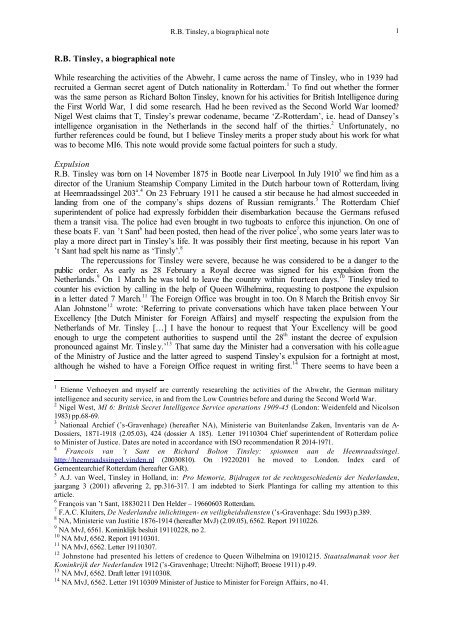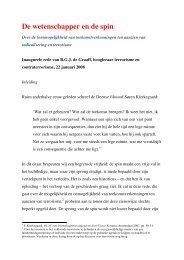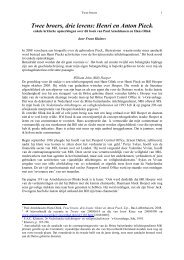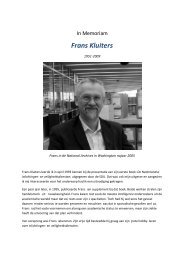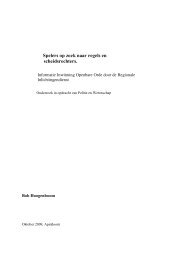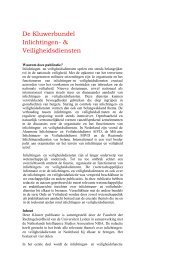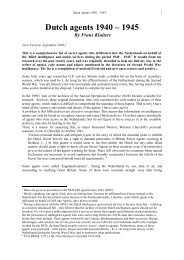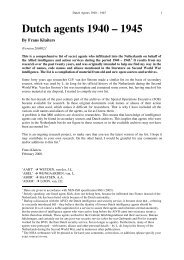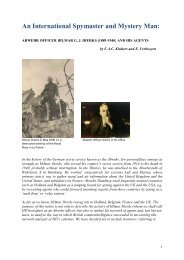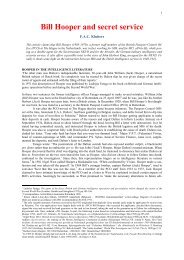R.B. Tinsley, a biographical note While researching the ... - Nisa
R.B. Tinsley, a biographical note While researching the ... - Nisa
R.B. Tinsley, a biographical note While researching the ... - Nisa
Create successful ePaper yourself
Turn your PDF publications into a flip-book with our unique Google optimized e-Paper software.
R.B. <strong>Tinsley</strong>, a <strong>biographical</strong> <strong>note</strong> 1R.B. <strong>Tinsley</strong>, a <strong>biographical</strong> <strong>note</strong><strong>While</strong> <strong>researching</strong> <strong>the</strong> activities of <strong>the</strong> Abwehr, I came across <strong>the</strong> name of <strong>Tinsley</strong>, who in 1939 hadrecruited a German secret agent of Dutch nationality in Rotterdam. 1 To find out whe<strong>the</strong>r <strong>the</strong> formerwas <strong>the</strong> same person as Richard Bolton <strong>Tinsley</strong>, known for his activities for British Intelligence during<strong>the</strong> First World War, I did some research. Had he been revived as <strong>the</strong> Second World War loomed?Nigel West claims that T, <strong>Tinsley</strong>’s prewar codename, became ‘Z-Rotterdam’, i.e. head of Dansey’sintelligence organisation in <strong>the</strong> Ne<strong>the</strong>rlands in <strong>the</strong> second half of <strong>the</strong> thirties. 2 Unfortunately, nofur<strong>the</strong>r references could be found, but I believe <strong>Tinsley</strong> merits a proper study about his work for whatwas to become MI6. This <strong>note</strong> would provide some factual pointers for such a study.ExpulsionR.B. <strong>Tinsley</strong> was born on 14 November 1875 in Bootle near Liverpool. In July 1910 3 we find him as adirector of <strong>the</strong> Uranium Steamship Company Limited in <strong>the</strong> Dutch harbour town of Rotterdam, livingat Heemraadssingel 203 a . 4 On 23 February 1911 he caused a stir because he had almost succeeded inlanding from one of <strong>the</strong> company’s ships dozens of Russian remigrants. 5 The Rotterdam Chiefsuperintendent of police had expressly forbidden <strong>the</strong>ir disembarkation because <strong>the</strong> Germans refused<strong>the</strong>m a transit visa. The police had even brought in two tugboats to enforce this injunction. On one of<strong>the</strong>se boats F. van ’t Sant 6 had been posted, <strong>the</strong>n head of <strong>the</strong> river police 7 , who some years later was toplay a more direct part in <strong>Tinsley</strong>’s life. It was possibly <strong>the</strong>ir first meeting, because in his report Van’t Sant had spelt his name as ‘Tinsly’. 8The repercussions for <strong>Tinsley</strong> were severe, because he was considered to be a danger to <strong>the</strong>public order. As early as 28 February a Royal decree was signed for his expulsion from <strong>the</strong>Ne<strong>the</strong>rlands. 9 On 1 March he was told to leave <strong>the</strong> country within fourteen days. 10 <strong>Tinsley</strong> tried tocounter his eviction by calling in <strong>the</strong> help of Queen Wilhelmina, requesting to postpone <strong>the</strong> expulsionin a letter dated 7 March. 11 The Foreign Office was brought in too. On 8 March <strong>the</strong> British envoy SirAlan Johnstone 12 wrote: ‘Referring to private conversations which have taken place between YourExcellency [<strong>the</strong> Dutch Minister for Foreign Affairs] and myself respecting <strong>the</strong> expulsion from <strong>the</strong>Ne<strong>the</strong>rlands of Mr. <strong>Tinsley</strong> […] I have <strong>the</strong> honour to request that Your Excellency will be goodenough to urge <strong>the</strong> competent authorities to suspend until <strong>the</strong> 28 th instant <strong>the</strong> decree of expulsionpronounced against Mr. <strong>Tinsley</strong>.’ 13 That same day <strong>the</strong> Minister had a conversation with his colleagueof <strong>the</strong> Ministry of Justice and <strong>the</strong> latter agreed to suspend <strong>Tinsley</strong>’s expulsion for a fortnight at most,although he wished to have a Foreign Office request in writing first. 14 There seems to have been a1 Etienne Verhoeyen and myself are currently <strong>researching</strong> <strong>the</strong> activities of <strong>the</strong> Abwehr, <strong>the</strong> German militaryintelligence and security service, in and from <strong>the</strong> Low Countries before and during <strong>the</strong> Second World War.2 Nigel West, MI 6: British Secret Intelligence Service operations 1909-45 (London: Weidenfeld and Nicolson1983) pp.68-69.3 Nationaal Archief (’s-Gravenhage) (hereafter NA), Ministerie van Buitenlandse Zaken, Inventaris van de A-Dossiers, 1871-1918 (2.05.03), 424 (dossier A 185). Letter 19110304 Chief superintendent of Rotterdam policeto Minister of Justice. Dates are <strong>note</strong>d in accordance with ISO recommendation R 2014-1971.4Francois van ’t Sant en Richard Bolton <strong>Tinsley</strong>: spionnen aan de Heemraadssingel.http://heemraadssingel.vinden.nl (20030810). On 19220201 he moved to London. Index card ofGemeentearchief Rotterdam (hereafter GAR).5 A.J. van Weel, <strong>Tinsley</strong> in Holland, in: Pro Memorie, Bijdragen tot de rechtsgeschiedenis der Nederlanden,jaargang 3 (2001) aflevering 2, pp.316-317. I am indebted to Sierk Plantinga for calling my attention to thisarticle.6 François van ’t Sant, 18830211 Den Helder – 19660603 Rotterdam.7 F.A.C. Kluiters, De Nederlandse inlichtingen- en veiligheidsdiensten (’s-Gravenhage: Sdu 1993) p.389.8 NA, Ministerie van Justitie 1876-1914 (hereafter MvJ) (2.09.05), 6562. Report 19110226.9 NA MvJ, 6561. Koninklijk besluit 19110228, no 2.10 NA MvJ, 6562. Report 19110301.11 NA MvJ, 6562. Letter 19110307.12 Johnstone had presented his letters of credence to Queen Wilhelmina on 19101215. Staatsalmanak voor hetKoninkrijk der Nederlanden 1912 (’s-Gravenhage; Utrecht: Nijhoff; Broese 1911) p.49.13 NA MvJ, 6562. Draft letter 19110308.14 NA MvJ, 6562. Letter 19110309 Minister of Justice to Minister for Foreign Affairs, no 41.
R.B. <strong>Tinsley</strong>, a <strong>biographical</strong> <strong>note</strong> 2slight conflict of responsibilities, because on 13 March <strong>the</strong> Minister for Foreign Affairs, withoutinforming his colleague, assured <strong>the</strong> Foreign Office in <strong>the</strong> person of Lord Acton that an extension ofMr. <strong>Tinsley</strong>’s residence permit had been granted. 15On 24 March <strong>Tinsley</strong> was questioned about his plans by <strong>the</strong> Rotterdam police. 16 Well, heplanned to leave by train for Antwerp in Belgium on 27 March, and indeed, on that day a policemanobserved <strong>Tinsley</strong> and his wife 17 doing just that.From <strong>the</strong> documents it does not become clear whe<strong>the</strong>r any o<strong>the</strong>r forces may have been atwork, which might have pointed to ano<strong>the</strong>r, more significant side of <strong>Tinsley</strong>, viz. his secret serviceactivities. 18 However, surprisingly fast his expulsion was to be rescinded. At <strong>the</strong> end of April <strong>the</strong>Minister of Justice wrote to his colleague, <strong>the</strong> Minister for Foreign Affairs, that he did not deem itnecessary anymore to deny <strong>Tinsley</strong>’s reentry into <strong>the</strong> Ne<strong>the</strong>rlands. 19 Less than a month later QueenWilhelmina signed a Royal decree in which <strong>the</strong> former decree was revoked. 20 Just a few days before,<strong>Tinsley</strong> had assured Her Majesty in writing that he would abstain from any illegal activities. 21 Hewould not keep his promise.Secret serviceWe do not know when <strong>Tinsley</strong>, a retired naval lieutenant (later captain) 22 , was called upon to provideintelligence to <strong>the</strong> Secret Service Bureau, founded by Mansfield Cumming in 1909. 23 Given AlanJudd’s comments on <strong>Tinsley</strong>, based on <strong>the</strong> diaries of Cumming, it may be that <strong>Tinsley</strong> becameinvolved in or shortly after 1913. 24 On 27 September 1914 Cumming <strong>note</strong>d ‘with satisfaction that hehad secured <strong>the</strong> rank of commander, Royal Naval Reserve, for a businessman, Richard <strong>Tinsley</strong>, whomhe had sent to Rotterdam to open up a station.’ According to Judd, in 1910 Cumming ‘favouredBrussels over Copenhagen [as ‘Branch Centre’ in a European capital] because of its centrality in <strong>the</strong>event of war, its ease of access and “its Club, its English society, and its modern and cheap mode ofliving”. [The overall head of Intelligence at General Headquarters, brigadier-general George]MacDonogh, on <strong>the</strong> o<strong>the</strong>r hand, now favoured Copenhagen or Amsterdam as being “less infected withspies”.’ 25 Judd <strong>note</strong>s that ‘no overseas Secret Service station would in fact be established until <strong>the</strong>autumn of 1913.’ 26 It seems logical to assume that <strong>Tinsley</strong>’s station was opened after this main stationin Brussels. This, however, does not exclude <strong>the</strong> possibility that <strong>Tinsley</strong> was recruited at an earlierdate.The Dutch government accepted his appointment as consul of Nicaragua in Rotterdam at <strong>the</strong>end of 1917. 27 We do not know what <strong>the</strong> Foreign Office thought about his consular activities, becauseit knew about his reputation for ‘lying and unscrupulous intriguing’. 28 <strong>Tinsley</strong> had already lied about<strong>the</strong> true circumstances regarding <strong>the</strong> Russian remigrants in 1911. The FO had relayed his version of<strong>the</strong> incident to <strong>the</strong> Dutch government, which <strong>the</strong>n had been able to challenge his story with vigour.Judd describes <strong>Tinsley</strong> as an ‘energetic, self-advertising and none too scrupulous former businessman15 NA MvJ, 6562. Draft letter 19110313.16 NA MvJ, 6562. Undated report of S. Dijkstra.17 Ca<strong>the</strong>rine Bell, 18750731 Liverpool.18 Van Weel claims such circumstances, but <strong>the</strong> documents in <strong>the</strong> archives of <strong>the</strong> Ministry of Justice do notsupport this. A search for internal reports about <strong>the</strong> conversations with Johnstone in <strong>the</strong> archives of <strong>the</strong> Ministryof Foreign Affairs was not successful.19 NA MvJ, 6563. Letter 19110429.20 NA MvJ, 6563. Koninklijk besluit 19110522, no 84.21 NA MvJ, 6563. Letter 19110519.22 Christopher Andrew, Secret service: <strong>the</strong> making of <strong>the</strong> British Intelligence Community (London: Heinemann1985) p.8223 Alan Judd, The quest for C: Sir Mansfield Cumming and <strong>the</strong> founding of <strong>the</strong> British Secret Service (London:HarperCollins 1999) p.83.24 Judd p.282.25 Judd p.203.26 Judd p.205.27 GAR, 1565A, G 136/1917. Letter 19171127. <strong>Tinsley</strong> stayed on as consul till 1928. This year, however, is notconsistent with his leaving Rotterdam in 1922. Staatsalmanak voor het Koninkrijk der Nederlanden 1929 (’s-Gravenhage: Nijhoff 1928) p.71.28 Judd p.416.
R.B. <strong>Tinsley</strong>, a <strong>biographical</strong> <strong>note</strong> 3whose later role, despite his faults, was important and beneficial. Conversations with him involveddays of talks [beginning on 21 May 1915] – “Capt. <strong>Tinsley</strong> arrived at 11 and stayed until 6.30 with ashort interval for lunch” – especially when his extravagant but generally successful claims forcompensation for his alleged loss of earnings and business were <strong>the</strong> subject.’ 29For his reputation for ‘unscrupulous intriguing’ it serves to cite Michael Occleshaw:‘According to S.P[ayne] Best, who spent a year in <strong>the</strong> Secret Service in <strong>the</strong> Ne<strong>the</strong>rlands and was<strong>the</strong>refore in a position to know, a British diplomatic consortium <strong>the</strong>re was engaged in what he termedan “absolutely scandalous business”. Necessary parties to this affair were Oppenheim and Maxse,already deeply involved in secret Intelligence, and Sir Francis Oppenheimer, Commercial Attaché at<strong>the</strong> Hague. This triumvirate, with <strong>the</strong> aid of <strong>Tinsley</strong>’s agents, ran what was virtually a system ofblackmail known as “The Black Book”, listing firms which traded with Germany via <strong>the</strong> Ne<strong>the</strong>rlands.Their trade was profitable because a proportion of it was in contraband goods which would fetch ahigh price on <strong>the</strong> black market in Germany and <strong>the</strong>y were thus extremely vulnerable to Britishpressure, both Naval and diplomatic. The firms listed were politely asked to help by having <strong>the</strong>irrepresentatives send back information for <strong>the</strong> British from Germany and even to pass selected Britishagents into Germany disguised as <strong>the</strong>ir representatives. Behind <strong>the</strong> polite request, as <strong>the</strong>y knew onlytoo well, hung <strong>the</strong> threat of ruin, but in return for active cooperation <strong>the</strong> passage of <strong>the</strong>ir goods was leftunhindered. In most cases <strong>the</strong> pressure worked. In one case, at least, a salvage tug company, Smits,paid <strong>the</strong> triumvirate 100,000 guilders to be kept off <strong>the</strong> list and out of active compliance with Britishwishes.’ 30 Apparently, salvaging both German and British ships was booming business for Dutch tugcompanies. According to Judd, a subsequent War Office investigation failed to find any evidence ofblackmail. 31 This outcome is not surprising since <strong>the</strong> military attaché at The Hague, lieutenant-colonelLaurence Oppenheim, and Foreign Office officials like E.G.B. Maxse 32 , <strong>the</strong> consul general inRotterdam, were involved. 33Payne Best’s successful intelligence work illustrates his own lack of scruples for he <strong>note</strong>d: ‘Inthose days <strong>the</strong> Germans were just as keen to get hold of morphia or cocaine as addicts are nowadayswith heroin. I had a great deal of difficulty in getting permission to do this drug-pushing, in fact, I hadto go to <strong>the</strong> Prime Minister, to Lloyd George, and get his authority to buy large quantities of morphiatablets and cocaine. With this I was able to suborn quite a number of people in <strong>the</strong> German Army.’ 34Occleshaw comments: ‘Best had <strong>the</strong> soul to do and dare, though, and since he specifically states that<strong>the</strong> drugs were bought in large quantities, that would indicate exploitation on a grand scale. Indeed,according to his own account he “even managed to get as far as <strong>the</strong> German General Headquarterswhere, as a result, I got most valuable documents”.’ 35After meeting <strong>Tinsley</strong> for <strong>the</strong> first time, Sir Walter Kirke <strong>note</strong>d in November 1915: ‘He strikes me asbeing a smart fellow, but not a man for whom any really high class agent would work, such asRamble.[ 36 ] With him it is a matter of business and I doubt his imparting patriotic enthusiasm to29 Judd p.316.30 Michael Occleshaw, Armour against fate: British Military Intelligence in <strong>the</strong> First World War (London:Colombus 1989) p.203.31 Judd p. 416.32 E.G.B. Maxse; Louise de Colignyplein 11 The Hague.33 It is a pity that Judd, despite <strong>the</strong> fact that he acknowledges Christopher Andrew’s wisdom, has not usedOccleshaw’s book on British Intelligence during <strong>the</strong> Great War. Had he done so, Judd – a pseudonym of formersenior MI6 officer Alan Petty – would have been able to corroborate, dismiss or elaborate on certain details inOccleshaw’s book. Judd Acknowledgements. Francis Wheen, Villain of <strong>the</strong> peace, The Guardian, 20000329.34 Occleshaw p.208.35 Cumming’s entry for 19200916 about one of <strong>Tinsley</strong>’s agents, whose name Judd could not decipher, possiblyconcerns an agent, originally recruited/suborned by Payne Best. This agent ‘successfully burgled some safes in<strong>the</strong> German War Office to <strong>the</strong> great advantage of <strong>the</strong> Military HQ. Complimentary telegrams were frequentlyreceived from <strong>the</strong> MA [military attaché] in regard to <strong>the</strong>se. I [Cumming] have heard nothing of <strong>the</strong>m nor of <strong>the</strong>man nor of his methods but Capt. W– tells me that on Good Friday last he showed me a letter from <strong>the</strong> WarOffice giving instructions in <strong>the</strong> use of morphine – which was intended for him.’ Judd p.451.36 By Ramble, mademoiselle Louise de Bettignies alias Alice Dubois (1880-1918) was meant. MacDonogh’ssuperior, field-marshal Sir John French, described her as a ‘regular modern Joan of Arc’. She led Ramble’s
R.B. <strong>Tinsley</strong>, a <strong>biographical</strong> <strong>note</strong> 4agents. He <strong>the</strong>refore misses <strong>the</strong> best people, and I should never consider him capable of running ourshow in toto, without an officer in charge and always at his elbow.’ 37In February 1915 <strong>the</strong> Dutch Commander-in-chief informed <strong>the</strong> Minister for Foreign Affairs of <strong>the</strong>espionage activities, organised by <strong>the</strong> German consul C.R. Kneist and <strong>the</strong> British consul generalErnest Maxse, both in Rotterdam. 38 The latter had set up a successful espionage system, maintained by<strong>the</strong> British consul Shadwell 39 in Delfzijl, a nor<strong>the</strong>rn Dutch harbour town near <strong>the</strong> German port ofEmden. For instance, on 7 August 1914 he sent <strong>the</strong> following telegram: ‘Large German 3 funnelcruiser arrived Emden; damaged today; 8 torpedoboats left yesterday.’ The Commander-in-chiefremarked that <strong>the</strong> British consulate maintained a ‘zeer nauwe relatie’ – a very close relationship – with<strong>the</strong> Uranium Steamship Company.Uranium Steamship Company LimitedIn May 1915 <strong>the</strong> Rotterdam police already knew of <strong>Tinsley</strong>’s activities. An accountant of his firm, J.F.Cowie 40 , had been arrested for public drunkenness in <strong>the</strong> night of 4 to 5 May. 41 He had papers and<strong>note</strong>s on his person which indicated an involvement in espionage, and interrogation seemed to confirmthis suspicion. Cowie also acted as a courier for <strong>the</strong> British consulate in Rotterdam, delivering <strong>the</strong>diplomatic mailbag at <strong>the</strong> Hook of Holland-Harwich ferry. He also provided information aboutGermany to his friend Noble, an engineer at <strong>the</strong> Telegraph Office in London. Reports which weremade by <strong>the</strong> company were paid for by <strong>the</strong> British consulate. Cowie’s <strong>note</strong>book was found to containseveral names, including a certain D. de Peterson. 42 It is interesting to see that Cowie had also <strong>note</strong>d<strong>the</strong> name and address of <strong>the</strong> German consul in Rotterdam, Kneist, who was constantly struggling withBritish Intelligence.According to <strong>the</strong> telephone directory for 1915, D. de Peterson, a son of <strong>the</strong> Russian consul general inThe Hague and secretary to <strong>the</strong> Russian consul in Rotterdam, was a certified Russian languagetranslator. His full name probably was Dmitry de Peterson 43 , which was already known to <strong>the</strong> Dutchpolice. From <strong>the</strong> German police in Hamburg a Dutchman had learned details about <strong>the</strong> clandestinehanding over to British Intelligence of information about German ship movements copied fromtelegrams from <strong>the</strong> Dutch Coastguard to <strong>the</strong> Navy’s Coastguard HQ in Amsterdam. 44 The Navywanted to know all about ship movements near <strong>the</strong> Dutch coast. Subsequent investigations revealedthat <strong>the</strong> Germans had indeed an effective counter espionage service in Amsterdam. The Hamburgpolice knew that an employee at <strong>the</strong> Telegraph Office in Amsterdam had been recruited by someonecalled Stern in September 1914. This employee was M.J. Peeters, who made copies of <strong>the</strong> Coastguardtelegrams and sent <strong>the</strong>m to a ‘Mr. De Jong’, c/o a kiosk at <strong>the</strong> Westermarkt in Amsterdam. In October1914 an investigation brought to light that De Jong and Stern were identical with De Peterson. At <strong>the</strong>system with vigour and panache till her arrest in November 1915. Occleshaw pp.244-245. Andrew pp.142-144.Personal archive E. Verhoeyen. Unpublished <strong>biographical</strong> <strong>note</strong> concerning L. de Bettignies by P. De Cock. I amindebted to Etienne Verhoeyen for calling my attention to this source, as well as to two o<strong>the</strong>r sources, mentionedin <strong>note</strong>s 62 and 69.37 Kirke, cited in Occleshaw p.159.38 NA, Ministerie van Defensie, Generale Staf (AHK), 1914-1940 (hereafter MinDef GS) (2.13.70), 336 (1945GS). Letter 19150225 Commander-in-chief to Minister for Foreign Affairs.39 Shadwell had been exp elled from Emden. At Delfzijl he was succeeded by consul Kearney, who alsocontributed to intelligence ga<strong>the</strong>ring. Dutch authorities felt awkward about Kearney’s espionage activities. Thiswas solved by his transfer to Dunkirk. NA MinDef GS, 336 (1399 GS). Letter 19150208 Commander Delfzijl toCommander-in-chief.40 John Farkuhar Cowie, 18600205 Camrie (Banffshire); Nieuwe Binnenweg 164 Rotterdam.41 NA MinDef GS, 336 (4901 GS). Letter 19150511 Chief superintendent of Rotterdam police to Commanderin-chief.42 NA MinDef GS, 336. Report 19150505 of S. Dijkstra. O<strong>the</strong>r names were: R. Rae (Lieve Verschuierstraat 32 b ),Th.H. Meulkens, vice consul H. Tom (Witte de Withstraat 14 a ), and Mrs H. Kolff A. Qzn-Havelaar (Westerkade20), all in Rotterdam. Some company staff members were listed in <strong>the</strong> telephone directory for 1915: Don Czopp,Meulkens and Rae.43 Dmitry de Peterson, 18861208 Jassy (Iasi), Romania – 19441226 The Hague; Mauritsweg 18 Rotterdam.44 NA MinDef GS, 336. Letter 19150225 Commander-in-chief to Minister for Foreign Affairs.
R.B. <strong>Tinsley</strong>, a <strong>biographical</strong> <strong>note</strong> 5trial of Peeters, De Peterson, an employee of <strong>the</strong> Uranium Steamship Company, denied everything, bu<strong>the</strong> now had <strong>the</strong> attention of <strong>the</strong> police.Peeters’ sentence is unknown, but it must have been a modest one, because during his shortcareer in espionage his actions were not considered detrimental to <strong>the</strong> interests of <strong>the</strong> Ne<strong>the</strong>rlands. InJune 1915 <strong>the</strong> Dutch Commander-in-chief even stated that arrest and interrogation could be considereda sufficient warning and deterrent, because in many cases a suspicion of espionage on behalf of <strong>the</strong>Allies or of Germany turned out to be very hard to prove in a court of law. 45Some of De Peterson’s earlier activities were described in a report of <strong>the</strong> Rotterdam police in June1915. 46 At <strong>the</strong> end of August 1914 he had recruited Willem Both and J.M. van Gelderen, twoDutchmen living in Rotterdam, for sending coded telegrams about troop movements from Frankfurt.Van Gelderen and Both soon were arrested. Both was sentenced to five years in prison; Van Gelderento one year. O<strong>the</strong>rs, arrested for similar activities, were sent to prison for eighteen months to eightyears. 47 When Both’s wife heard of <strong>the</strong> sentence, she managed to locate De Peterson at <strong>the</strong> UraniumSteamship Company of <strong>Tinsley</strong>. De Peterson gave her a lump sum of 60 guilders, followed by severalpayments of 25 guilders. Apparently De Peterson had been organising a network in Germany with<strong>Tinsley</strong>. The latter, with <strong>the</strong> address Boompjes 75 in Rotterdam, was still mentioned in <strong>the</strong>Sonderfahndungsliste of September 1939, <strong>the</strong> German record of persons to be arrested after <strong>the</strong>invasion. 48 De Peterson was listed too. After WWI he apparently had continued his career inIntelligence, while being attached to <strong>the</strong> publishing firm of W.N.J. van Ditmar in Rotterdam. 49 DuringWWI this firm had employed a deserted German sergeant – an engineer in civil life – who had beeninvolved with <strong>the</strong> defensive works in Antwerp. 50 At Van Ditmar’s firm he drew sketches of <strong>the</strong>seworks and sold <strong>the</strong>m to British Intelligence, probably to military attaché Oppenheim. 51 After <strong>the</strong> war,staff members of Van Ditmar suspected De Peterson of espionage because of his mysteriousbehaviour. The same behaviour was observed in ano<strong>the</strong>r regular visitor to <strong>the</strong> firm, S. Payne Best,‘every inch a spy’.In September 1915 Salomon Schanzer Jr 52 , a German newspaper correspondent, stationed inRotterdam, wrote about meeting a German acquaintance in this city, a Kriminalpolizeikommissar fromCologne. 53 In Germany one of <strong>the</strong> agents of <strong>the</strong> De Peterson-<strong>Tinsley</strong> network had been arrested andhad admitted having sent his reports to postbus 656, belonging to <strong>the</strong> Uranium Steamship Company.The Kommissar had been sent to check up on this P.O. box, and he unsuccessfully tried to recruitSchanzer, in order to gain access to letters sent to this address.It seems that <strong>Tinsley</strong>’s centre of control was infiltrated. On <strong>the</strong> premises of his company <strong>the</strong>re was alsolocated a hotel for emigrants, locally known as <strong>the</strong> Uranium Hotel, which was run by Mr and MrsHuber 54 . 55 Gottfried Huber was an ex-purser, who became involved in <strong>Tinsley</strong>’s espionage activitiesafter WWI had broken out. 56 Therèse Huber provided Walter Schwäbsch alias Patent – who wasworking for German counterespionage – with names of Germans who were suspected of betraying45 NA MinDef GS, 337 (6379 GS). Draft letter 19150622 Commander-in-chief to Minister of Justice.46 NA MinDef GS, 337 (6272 GS). Report 19150611 by inspector C. van der Pol.47 Hartog Blaaser and Mozes van Arend: eight years. Meyer Blaaser: eig<strong>the</strong>en months.48 The address of <strong>the</strong> Uranium Steamship Company Ltd was Boompjes 76 a .49 Elka Schrijver, Oorlogsbelevenissen (Amsterdam; Dieren: De Bataafsche Leeuw 1984) pp.20-21.50 NA MinDef GS, 337 (8589 GS). Copy letter 19150813 Public prosecutor Rotterdam to Procurator-general ’s-Gravenhage.51 On 19150813 a search of <strong>the</strong> premises seemed to confirm <strong>the</strong> suspicion of espionage. Van Ditmar waseventually acquitted. NA MinDef GS, 336 (8946 GS). Copy letter 19150824 Public prosecutor Rotterdam toProcurator-general Rotterdam; 353 (2034 GS). Letter 19160309 Public prosecutor Rotterdam to Commander-inchief.52 Salomon Schanzer, 18810322 Witanowitz, Austria.53 GAR, 1554C, GW 36/1915. Letter 19150927 S. Schanzer Jr to Queen Wilhelmina.54 Gottfried Theodor Huber; Therèse Françoise Huber-Kohls.55 Telephone directory 1915.56 NA MinDef GS, 353 (8659 GS). Copy letter 19160916 F.W.H. Nussholz to Abwehr Nord.


